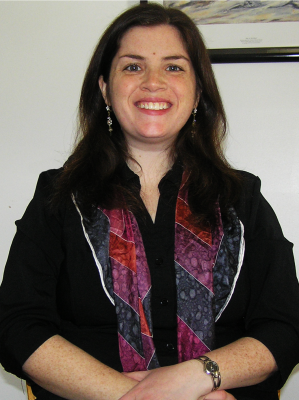Postdoc Spotlight: Rebecca Dyer

What is your area of research?
Broadly speaking, I study moral psychology. In particular, my main line of research since I’ve been at Cornell has been to study perceptions of blame and the interaction between perpetrator-blame and victim-blame. My work shows that when it comes to victims and perpetrators, blame seems to be zero-sum; as blame for the victim of a crime increases, blame for the perpetrator correspondingly decreases. Among a few other lines of research, I’ve been working to explore this relationship in depth.
What inspired you to choose this field of study?
I’ve been interested in moral psychology since my senior year in undergrad, when I conducted my thesis project on lying, and I explored various aspects of moral behavior throughout graduate school. Specifically regarding my research on blame, I was largely influenced by a number of events in the news. A few years ago, for example, news anchors on CNN received attention for their on-air expression of sympathy for two high school students convicted of sexual assault, lamenting the loss of their promising futures, while largely ignoring the plight of their victim. I remember being deeply struck by this situation. On an abstract level, I could certainly understand some of the factors—culture, gender dynamics, etc.—that had played a role in what had happened. On a personal level, I was disturbed both by the crime itself and the reactions like those of the news anchors. And on an intellectual level, I wanted to study it!
Why is this research important?
I think a big part of why this research is important is because of the direct implications for how blame works in “the real world.” You don’t have to look far to find real-life examples of victim-blaming, and my research points toward some potential ramifications in terms of the legal system and the way that we, as a society, treat victims and perpetrators.
How do you integrate research into your teaching or vice versa?
I haven’t yet had the chance to implement all the new things I’ve learned into my own teaching, but lately I’ve really appreciated some of the events sponsored by the Cornell Center for Teaching Innovation and the CIRTL Network that have shown me a lot about the science of teaching.
You participated this fall in the Students Reading Real Science practicum with AAAS and CIRTL Network. Why did you decide to enroll in this program as a postdoc?
I first heard about the course from a Cornell email list, and it sounded like a great opportunity. My current position is purely research-based, with no teaching requirements, but I genuinely enjoy teaching and wanted to continue to enhance my skills in teaching undergraduates.
Can you tell me about the course itself and what the benefits of participating in it were for you?
It was an online course, which I hadn’t taken before, so that on its own was a good experience. The course was designed around creating annotations for an article from the journal Science, in order to make it more accessible to an undergraduate audience. The course also focused more generally on how to help undergraduate students learn about science (with an emphasis on STEM fields, but also some social science) from primary sources. In addition to learning some new teaching/evaluation techniques and classroom activities, you end up with an annotated article that will be posted on the Science in the Classroom website (scienceintheclassroom.org) and used as a resource in undergraduate courses. It’s a cool way to have a real impact on how science is taught and learned.
How will your participation in this course help shape your future research and/or teaching methods?
It will certainly help shape my teaching. The course got me to think in different ways about how to bring research into the classroom in a meaningful way.
Have you been involved with any other CIRTL at Cornell programs? If so, can you please elaborate?
Last semester, I virtually attended a few CIRTLCast webinars. There were a number of sessions on effective and inclusive research mentoring. I also went to a few talks/workshops as part of the Academic Job Search Series over the summer.
What are the benefits of participating in programs like those run by CIRTL at Cornell?
There are so many of these programs, both right on campus and online, so it’s a great opportunity to take your time at Cornell to develop not only as a scientist and researcher, but also as an educator. It’s easy to pick and choose the events that are most relevant to you and your career, and the people involved are excellent resources.
What’s next for you?
Hopefully finding a position as an assistant professor in psychology!
Interview by Sally Kral, communications and outreach assistant in the Graduate School.
